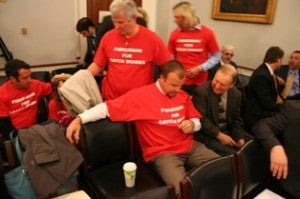A hearing today in the House Committee on Natural Resources, Subcommittee on Insular Affairs, Oceans and Wildlife mostly overlooked evidence of the benefits of catch shares and instead zeroed in on fears. Out of the eight witnesses who testified, just one was a fisherman, Bob Dooley, who has actually fished in a catch share program.
Reflecting on his personal experience fishing in catch share-managed fisheries, Bob Dooley, a fisherman from California, told the committee that “an investment in catch shares … will provide huge benefits to fishing families and coastal communities.” Other fishermen supportive of catch shares submitted written comments such as Glen Brooks, a grouper fisherman from Florida and president of the Gulf Fishermen’s Association. A number of pro-catch share fishermen also came to the hearing with bold t-shirts that read “Fisherman for Catch Shares.”
The mostly negative tenor of the hearing didn’t come as a surprise. Fishermen and lawmakers have good reasons to be frustrated these days. Overfishing has continued in many of the nation’s most valuable fisheries despite years of ever-restrictive measures that have put thousands of fishermen out of business. Today more than 60 federal fish stocks are overfished or have overfishing occurring. The result is declining catches and shrinking revenues for fishermen.
Contrast that picture with catch shares, which can lead to greater prosperity, sustainability and flexibility for fishermen. When the red snapper fishery in the Gulf of Mexico faced severe restrictions because of overfishing, fishery managers worked with commercial fishermen to develop a catch share program, which has increased dock-side prices, decreased bycatch and helped end overfishing (Steele 2008). Red snapper populations are now rebounding, meaning more fish for everyone, including recreational fishermen.

Fishermen wear t-shirts voicing their support for catch shares at the April 22, 2010 Natural Resources Committee hearing on catch shares and communities: "Fishermen for Catch Shares".
There was some talk today about concern for fishing communities and the tools available with catch shares – and not available under conventional management – like permit banks, quota set-asides like adaptive management programs, and community development quotas. These tools guarantee that the values of communities will be respected whether that means providing a way for new fishermen to enter the fishery or making sure that jobs associated with the fishery remain local.
Many of the witnesses complained about the impacts on their businesses and communities of shortened fishing seasons under traditional management systems, yet failed to recognize that shifting to catch shares would allow them to fish throughout the year.
This hearing should have focused more on how to design catch shares that best reflect the needs and values of fishermen, fishing communities and the nation. That’s a big enough job and where the discussion about catch shares ought to be.











3 Comments
Catch Shares are nothing other than a redistribution of wealth. I’m sure EDF flew all these Judas-fishermen from around the country, put them up in a nice hotel. These guys are obviously in the winner’s circle. How sad, to think about the many job losses that are UNNECESSARY.
Mary Beth – the fishing industry has been shedding tens of thousands of jobs for years under traditional fisheries management. The problem is that in many fisheries there are fewer and fewer fish to catch. Catch Shares systems have been proven to do the most important thing for fishing jobs, which is to rebuild the fishery. Throw in the added bonus that fishermen can choose when to fish throughout the year, so the jobs becomes safer and steadier, and that all the fishermen share in the upside as the fisheries recover, and I think you have a sound argument for giving them a try. Why stay with failed traditional management systems when all they’ve ever done is kill fishing jobs and profits while failing to maintain fisheries?
Mike, please tell me what ITQ/catch share fishery has been proven to rebuild fish stocks.
Catch Shares basis is ownership increases stewardship. Well 25% will OWN fish by leasing or selling future fish shares. What about the 75% displaced fishermen? History has shown this INCREASES fishing because they now will fish in state waters.
So you admit we’ve all ready consolidated fishermen. When is consolidation enough?
In my gen cat scallop fishery, we went from over 2900 permits in ’06 to 369, under catch shares about 50 boats are viable. Scallops are NOT over fished now or lately. Scallops are dying of old age in some closed areas. Scallops are at the second highest level since reporting.
There is no argument to defend giving ownership of fish away.Government is mismanaging the resources, so let’s give it away.